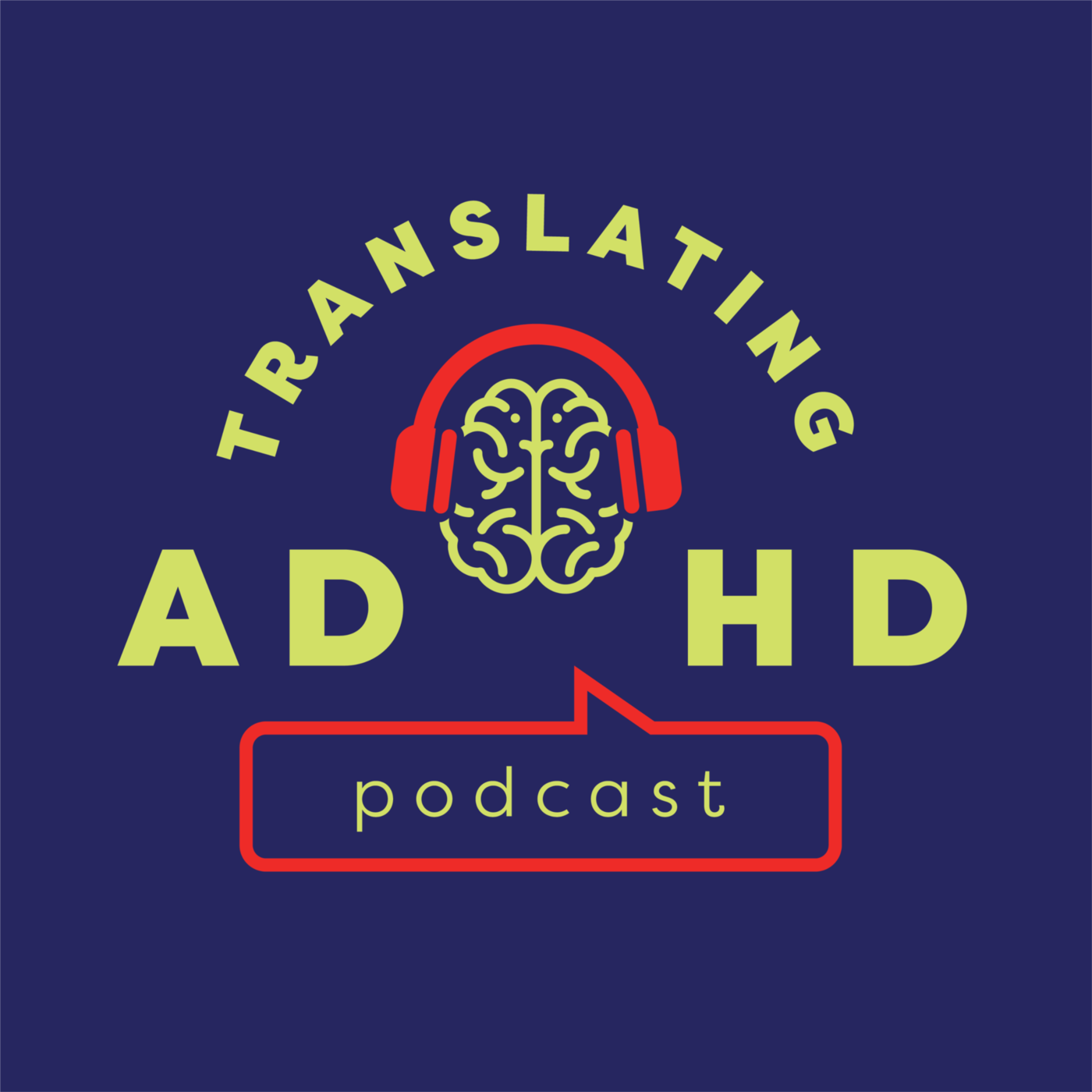
1.4M
Downloads
268
Episodes
We believe that success with ADHD is possible... with a little translation. Hosts Asher Collins and Dusty Chipura, both ADHD coaches who have plenty of insight to share navigating their own ADHD experiences, discuss how to live more authentically as an adult with ADHD and how to create real, sustained change to achieve greater success. If you are an adult with ADHD who wants more out of their business, career, and life, this is the podcast for you!
Episodes
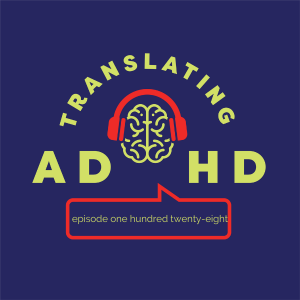
Monday May 16, 2022
Orienting to the Full Impact of our Experience with ADHD
Monday May 16, 2022
Monday May 16, 2022
Inspired by the client story from episode 127, Shelly and Cam dig deeper into the common elements the client engaged with, in part through her coaching with Shelly, to create more space, start trusting her brain and regain her own power in a difficult relationship dynamic. Cam and Shelly discuss the concept of ‘full impact’ and how those of us with ADHD can struggle to see all that is happening in our experience. This echoes First Barrier dilemmas (Barrier to Awareness.) Cam draws in the four elements of emotional intelligence and how getting to awareness and then management with self (introspection/reflection) and our social environment (perception) can be fraught with misinformation and stories that make seeking the truth challenging. Distinguishing what is real and what is not real is an early step to creating the space for informed and empowered change.
Both Shelly and Cam discuss the power of one’s own context and how it relates to activating curiosity and creativity (Cam’s boat in a lake metaphor) and journey thinking (Shelly’s pond metaphor). They also discuss how detaching from outcome and discerning ‘Mine’ from ‘Ours’ can create a context or frame for a place to start seeing the full impact of our experience.
Episode links + resources:
For more of the Translating ADHD podcast:
- Episode Transcripts: visit TranslatingADHD.com and click on the episode
- Follow us on Twitter: @TranslatingADHD
- Visit the Website: TranslatingADHD.com
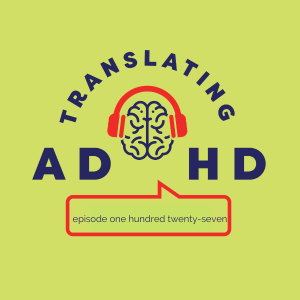
Monday May 09, 2022
Trusting our Brain when the Relationship Turns Toxic
Monday May 09, 2022
Monday May 09, 2022
Shelly shares how she first reframed the coaching work to help the client ‘strengthen my position’ so she could trust her brain and get a better read on the situation - to buy time and work on her own stuff so she could make an informed decision about the larger relational problems. Client and coach worked to gather more accurate data, distinguish the challenges from the greater challenges of the relationship and establish some consistencies in self-care practice. Listen as the client moves from making excuses for her partner’s behavior and blaming herself to a stance of choice and agency. A fascinating story of reclaiming one’s power and trusting one’s brain.
Episode links + resources:
For more of the Translating ADHD podcast:
- Episode Transcripts: visit TranslatingADHD.com and click on the episode
- Follow us on Twitter: @TranslatingADHD
- Visit the Website: TranslatingADHD.com
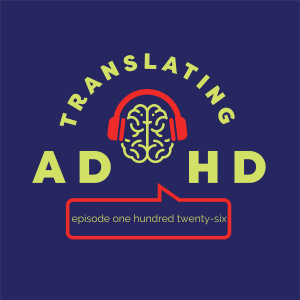
Monday May 02, 2022
Ignorance: The Common Enemy of ADHD
Monday May 02, 2022
Monday May 02, 2022
It’s a very human behavior to look for an easy and convenient enemy when we struggle to move forward. We see it in our current political landscape and we see it in the world of ADHD management. When ADHD is discovered in a relationship it can become an easy scapegoat for the dynamic that is not working. On a broader scale, we can point to neurotypicals as the source of our neurodivergent woes and vice versa. In this episode, Shelly and Cam continue to discuss the challenge of exploring one’s ADHD when one doesn't have the support of their partner.
The true enemy to positive change is ignorance and a propensity for all parties to jump to assumptions about confusing behavior. ADHD is invisible and inconsistent in its presentation. Cam and Shelly talk about the need to create space to explore our own ADHD experience so we can ultimately get to a place of trusting our own brain. They talk about the importance of bringing curiosity and compassion into the mix to locate and clarify a common base of knowledge - how one is experiencing their ADHD and how it impacts the relationship. One example is the ADHD behavior of the defensive/dismissive one two punch.
Shelly shares an excellent story about her own relationship and what she and her partner did to overcome a challenge and move forward recognizing each other’s needs. Finally, Cam discusses the importance of locating a community that supports and challenges and does not just echo one’s deepest fears and assumptions.
Episode links + resources:
For more of the Translating ADHD podcast:
- Episode Transcripts: visit TranslatingADHD.com and click on the episode
- Follow us on Twitter: @TranslatingADHD
- Visit the Website: TranslatingADHD.com
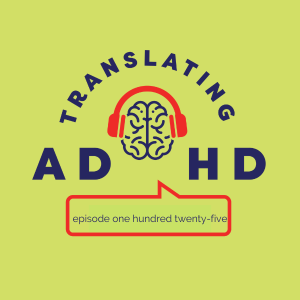
Monday Apr 25, 2022
When your Partner isn’t Supporting your ADHD Journey
Monday Apr 25, 2022
Monday Apr 25, 2022
Once ADHD is identified as a primary factor in the challenges of a relationship it can sometimes be identified as the sole dilemma. This is never the case in any relationship, yet anger, frustration and resentment build to a point where the non-ADHD partner withdraws support and vulnerability often with an ultimatum of “fix your ADHD!”. Our partners are not immune from making their own meaning and years of undiagnosed ADHD behavior - the missed events, the forgotten tasks - can build to a convincing story of “They must not care about me”.
The hosts introduce their BEANS acronym with a focus on safety, needs and agreements. A partner can’t support if their sense of safety has eroded too much. The invisibility and inconsistency of ADHD can create a sense of uncertainty and lack of safety in the relationship. Cam and Shelly discuss ways to proceed to start to dismantle the parent/child dynamic that so often happens. Shelly discusses how detaching from outcome and distinguishing ‘my stuff, their stuff, our stuff’ can be a place to start when the ADHD partner has to proceed by themselves. Ultimately through effective communication and setting independent expectations, the partners can reintroduce safety and start to rebuild trust, but there may be a moment when in fact we have to push ahead and go it alone for a spell.
Episode links + resources:
For more of the Translating ADHD podcast:
- Episode Transcripts: visit TranslatingADHD.com and click on the episode
- Follow us on Twitter: @TranslatingADHD
- Visit the Website: TranslatingADHD.com
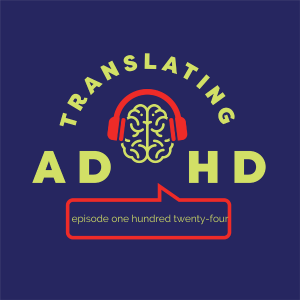
Monday Apr 18, 2022
Creating Value Around Identity and Purpose with ADHD
Monday Apr 18, 2022
Monday Apr 18, 2022
Shelly and Cam continue exploring the significance and process of creating value and dig into creating value around purpose and identity this week. They refine their Sense, Access, Value model through deeper discussion, new client examples and sharing practices for listeners. Value lives between attention and motivation, and ADHD disrupts the valuation process by limiting accessibility and awareness (Barriers I and II from episodes 94 and 104). Getting clear on what you need or what really matters is key to determining agency and is also highly dependent on timing. We need this information to be accessible at the times we need it most. Unfortunately with ADHD, when swept up in a dramatic moment the things that are valuable to us like identities, practices and purpose can fade into the background.
Shelly shares a story about how a client thought they needed to be more like a gregarious but abrupt co-worker. In exploring this, Shelly and her client soon realized that the client was creating false value around the attributes of this “Politician” individual. Further exploration revealed a desire for more connectedness to the client’s own sense of self - a desire to collaborate. Shelly shares how at first she didn’t see herself in the picture when considering a really important relationship decision, but when she circled back to consider what truly matters she got crystal clear on her next steps. Cam and Shelly discuss the importance of a positive feedback loop and that with incomplete information we can create a false picture of success. Finally, they share how listeners can use Pause, Disrupt, Pivot in the larger Sense, Access, Value framework.
Episode links + resources:
For more of the Translating ADHD podcast:
- Episode Transcripts: visit TranslatingADHD.com and click on the episode
- Follow us on Twitter: @TranslatingADHD
- Visit the Website: TranslatingADHD.com
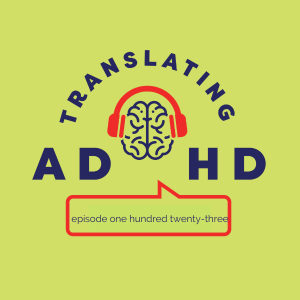
Monday Apr 11, 2022
The Valuation of Time and Emotion with ADHD
Monday Apr 11, 2022
Monday Apr 11, 2022
Cam and Shelly go Big-Brain this week tinkering with the very structural elements of their Mt. Rainier Model (episodes 60-63). They introduce a concept not often considered in conventional ADHD conversations - language that often includes terms like interest, regulation, management and attention. The term introduced this week is valuation, and valuation matters because it lives between attention and motivation. Valuation is simply the amount of value we place on something. Cam argues that those of us with ADHD struggle to see the value of something because of the disruptive nature of ADHD. You can’t value what you can’t access. You can’t access what you can’t sense. ADHD impacts our ability to both sense and access concepts like time and emotion.
Cam shares client examples that turn conventional wisdom on its head. Stories of clients challenging conventional takes on concepts like time and emotion. These clients are not just settling for management or regulation. These stories are forcing Cam to rethink the Rainier Cause and Effect model.
Finally, Cam and Shelly share a new process similar to Pause, Disrupt and Pivot. The new process is Sense, Access, Value. Cam and Shelly are just at the beginning with exploring this concept of valuation.
Episode links + resources:
For more of the Translating ADHD podcast:
- Episode Transcripts: visit TranslatingADHD.com and click on the episode
- Follow us on Twitter: @TranslatingADHD
- Visit the Website: TranslatingADHD.com
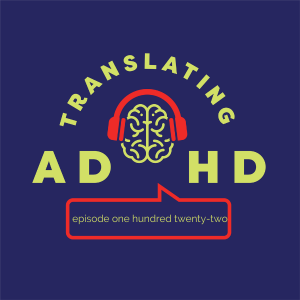
Monday Apr 04, 2022
Evoking Awareness as a Practice with ADHD
Monday Apr 04, 2022
Monday Apr 04, 2022
Hosts Shelly and Cam continue on the theme of practice and look at evoking awareness. Evoking Awareness is actually an important coaching competency and is key to the coaching process. Within this category is the all-important aspect of self-knowledge - personal values and strengths, challenges and needs, best practices, and what we like to call the client’s worldview. Also remember that awareness is one of the three barriers of ADHD. It can be hard to create new awareness and keep that awareness once we have it. Today Shelly and Cam discuss practices beyond coaching that can help evoke awareness and build self-knowledge.
Shelly shares a surprising practice of tarot card reading and how it helps her to consider questions in a larger context. Cam shares how inspiration practices help him evoke awareness. The hosts emphasize that the actual tool or practice is secondary to what the practice encourages - curiosity in a specific context. Those of us with ADHD can struggle with overwhelm and with orienting to opportunities and questions worth considering. A good tool is like coaching. It provides a contextual prompt to explore an area with curiosity to evoke new awareness.
Episode links + resources:
For more of the Translating ADHD podcast:
- Episode Transcripts: visit TranslatingADHD.com and click on the episode
- Follow us on Twitter: @TranslatingADHD
- Visit the Website: TranslatingADHD.com
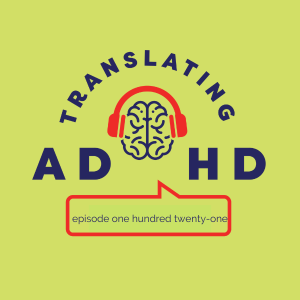
Monday Mar 28, 2022
Cultivating a Self-Care Practice with ADHD
Monday Mar 28, 2022
Monday Mar 28, 2022
Shelly and Cam discuss the significance of cultivating a self-care practice in this episode and start with distinguishing “should” activities and activities that “fill you up”.They first introduced self-care as a topic back in episode 95. In this episode, they look at self-care through the lens of cultivating a practice. Self-care is something both Shelly and Cam introduce to their ADHD coaching clients because it is the perfect vehicle to identify core values, key needs and practice making space for something that only matters to the client. ADHD can make it very difficult to identify and practice key self-care practices.
Shelly shares her own experience in coaching with Cam and the barrier to honoring and practicing her own self-care practices of attending live concerts. She talks about the brain soothing benefits of practicing self-care activities that really matter to the individual. Cam and Shelly identify barriers to developing new self-care practices, both limiting mindsets and avoidant behaviors that get in the way.
Finally, Cam and Shelly discuss client examples of how three similar activities, like running, are tethering to very different motivators for each client. Shelly and Cam leave listeners with first steps for cultivating a self-care practice.
Episode links + resources:
For more of the Translating ADHD podcast:
- Episode Transcripts: visit TranslatingADHD.com and click on the episode
- Follow us on Twitter: @TranslatingADHD
- Visit the Website: TranslatingADHD.com
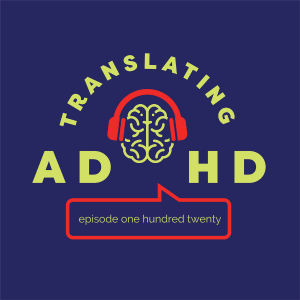
Monday Mar 21, 2022
Anchoring as a Practice with ADHD
Monday Mar 21, 2022
Monday Mar 21, 2022
Shelly and Cam explore anchoring as a practice this week. With the three barriers of awareness, action and learning, those of us with ADHD can lose touch with tried and true knowledge and proven practices. Seeing ourselves in the picture matters, but over time the picture can fade. Anchoring to what we know to be true is a proven practice to keep us tethered to our best practices and keeps us front and center in the picture. With ADHD we can set down knowledge and practices like setting down a set of keys. Eventually the keys become relevant when we need to drive somewhere. The irony here is that we can lose the awareness of the need or value of a practice or a nugget of relevant information. Literally out of sight, out of mind.
Shelly and Cam discuss how the pause from pause, disrupt, pivot is an opportunity to introduce an anchor practice. Shelly shares a client story where her client realizes how smelling a candle triggers a connection to a value of lightness and humor. Anchoring to what we know to be true opens us to living more authentically and within our values and strengths. The hosts leave the listener with an exercise to develop awareness around the practice of anchoring.
Episode links + resources:
For more of the Translating ADHD podcast:
- Episode Transcripts: visit TranslatingADHD.com and click on the episode
- Follow us on Twitter: @TranslatingADHD
- Visit the Website: TranslatingADHD.com
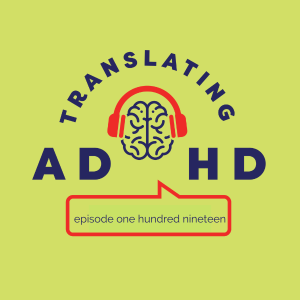
Monday Mar 14, 2022
Cultivating a Metaphor Practice with ADHD
Monday Mar 14, 2022
Monday Mar 14, 2022
Cam relays the story of how he used imagery to articulate his own ADHD experience, namely the difficulty of finishing any project. He shares metaphors of snow plows with ever-expanding blades to a version of the Odyssey where Odysseus fights the Cyclops a hundred times. In putting imagery to his ADHD experience, Cam was able to start to understand his specific challenges and start to create the change he wanted to have happen. Both Cam and Shelly discuss how coaches use metaphor with clients to create understanding and an opening for change.
Episode links + resources:
For more of the Translating ADHD podcast:
- Episode Transcripts: visit TranslatingADHD.com and click on the episode
- Follow us on Twitter: @TranslatingADHD
- Visit the Website: TranslatingADHD.com
